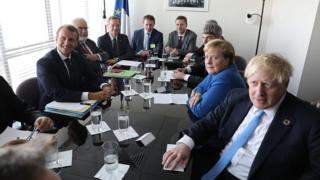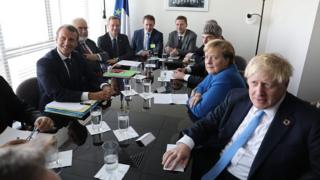Iran rejects fresh accusations over Saudi oil attack
The leaders of France, Germany and the UK backed US claims that Iran attacked oil installations. …

 Image copyright AFP
Image copyright AFP Iran has rejected a joint statement by the leaders of France, Germany and the UK who blamed it for attacks earlier this month on Saudi oil installations.
Iran’s foreign minister accused them of “parroting absurd US claims”.
The European leaders said there was no other plausible explanation for the attacks, which shut down half of Saudi Arabia’s oil production.
But they said they remained committed to the 2015 international deal on Iran’s nuclear programme.
Yemen’s Iran-aligned Houthi rebels have claimed they carried out the 14 September attacks while Iran itself has denied any involvement.
Eighteen drones and seven cruise missiles hit an oil field and processing facility.
Saudi Arabia has blamed Iran for the attacks, as has the US which is sending more troops to the kingdom.
What did the leaders say?
British Prime Minister Boris Johnson, French President Emmanuel Macron and German Chancellor Angela Merkel issued their statement on the sidelines of the UN General Assembly in New York.
“It is clear to us that Iran bears responsibility for this attack. There is no other plausible explanation. We support ongoing investigations to establish further details,” they said.
“The time has come for Iran to accept negotiation on a long-term framework for its nuclear programme as well as on issues related to regional security, including its missiles programme and other means of delivery,” the statement added.
Media playback is unsupported on your device
The three leaders expressed their “continued commitment” to the 2015 nuclear agreement, officially known as the Joint Comprehensive Plan of Action (JCPoA).
Tensions between the US and Iran have soared since President Donald Trump withdrew from the accord last year and re-imposed sanctions.
Speaking later on Monday, Mr Johnson called for a new nuclear deal with Iran negotiated by Mr Trump.
“If it was a bad deal, and I’m willing to accept that it had many, many defects, then let’s do a better deal,” he said in an interview with US media.
“I think there’s one guy who can do a better deal and one guy who understands how to get a difficult partner like Iran over the line and that is the president of the United States. So I hope that there will be a Trump deal, to be totally honest with you.”
Downing Street later stressed that Mr Johnson supports the JCPoA. The UK prime minister is due to meet Iranian President Hassan Rouhani later.
What has Iran said?
Iranian Foreign Minister Mohammad Javad Zarif ruled out the possibility of negotiating a new deal with world powers, saying that the three European partners had demonstrated “paralysis in fulfilling their obligations” without US approval.
He tweeted: “Solution to this deficiency – mustering will to forge independent path, not parroting absurd US claims and requests inconsistent with JCPoA.”
He added: “No new deal before compliance with the current one.”
Iran has warned the US and its allies against a military response to the attack in Saudi Arabia, saying that it is ready “to respond to any aggression”.
What’s the background?
Houthi rebels have repeatedly launched rockets, missiles and drones at populated areas in Saudi Arabia. They are in conflict with a Saudi-led coalition which backs a president who the rebels had forced to flee when the Yemeni conflict escalated in March 2015.
The war has killed nearly 10,000 people and pushed millions to the brink of starvation, the world’s worst man-made humanitarian disaster.
Iran, the regional rival of Saudi Arabia, is an opponent of the US, and tensions between the two have risen markedly this year. The US said Iran was behind attacks on two oil tankers in the Gulf in June and July, as well as on another four in May – accusations rejected by Tehran.




